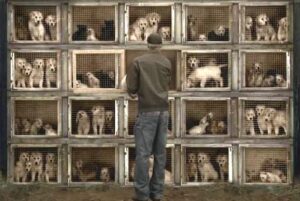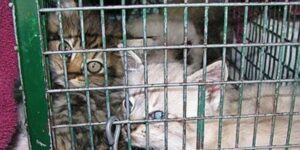Article:
The Tragedy of Puppy, Kitten, and Rabbit Mills

Finally – we have an exciting chance in NY State to make a difference in the lives of misery endured by animals imprisoned in puppy, kitten, and rabbit mills.
The Living Conditions of Animals in Puppy, Kitten, and Rabbit Mills is Horrendous
In what are essentially factories, females are confined to small cages and forced to produce litters as often as possible. Hundreds of dogs at a typical puppy mill live in wire cages often stacked upon each other, metal grids cutting into their feet, subject to urine and feces falling on them from the cages above. Most are never treated for diseases and wounds, never leave their cages until they are abandoned or killed, and never receive a kind word or loving contact. In addition, the puppies from these breeders, sold in pet stores, flea markets, or on the internet, often are subject to illnesses, physical problems, and/or socialization issues.
Estimates are that there are about 10,000 puppy mills in operation, with 500,000 dogs producing about 2.6 million puppies sold mostly in pet shops. The USDA is assigned the task of regulating these facilities and ensuring they meet some kind of minimum standards, but the agency rarely if ever enforces these regulations, with little or no punishment even for repeat violations. Apparently, the Animal Welfare Act does little if anything to help animals in puppy mills, restrained their entire lives in crates only inches bigger than their bodies. They can be denied social contact with other animals, bred as many times as they enter heat, then killed and dumped whenever their uterus shrivels. Kitten mills are a carbon copy of all the negative aspects of puppy mills. Breeding cats live in small, cramped quarters, also in wire cages that damage legs and feet, covered in matted fur, and sleeping in overflowing litter boxes. Mothers are bred until they drop.
Kittens are sick and dirty. They are kept in feces-stained pens, with no physical or mental stimulation, no view of the outside world, and no hope of ever leaving their enclosures. These poor cats suffer from infections, deformations, starvation and parasites.
Estimated 50% Bunnies Die Before Reaching Pet Shops
In rabbit mills, rabbits suffer the same atrocious conditions and high rates of disease. Most rabbits sold in pet stores are babies, only 3 months old, and almost half of them die from diseases or lack of care during the transport from the breeder to the pet shop.

Contact Your Legislators to Support Pending Bill to End Retail Sales
Currently, there is a bill pending in NY State to prohibit the retail sale of dogs, cats, and rabbits acquired from these animal factories – A.4283 and S.1130. It would allow pet shops to make space for adoptions from not-for-profit animal shelters and rescue groups instead. Both puppy and kitten mills contribute to dog and cat homelessness, overpopulation, and death. Beautiful, adoring and adorable companion animals languish in shelters in the hopes of finding a loving home. This legislation would give them the chance.
While the bill wouldn’t end these horrific breeding factories throughout the country, it would eliminate a major market in New York State and reduce the incentive for puppy, kitten, and rabbit mills to continue elsewhere. More than 300 cities and counties nationwide have passed similar laws, as well as two states. With this kind of momentum, we can end this misery once and for all.
Please call or email your NY legislators and ask them to support this extremely valuable bill – A.4283/S.1130. (Find your legislator at nyshumane.org/legislation/.)
New York State Humane Association Humane Review, Vol.XXXIX, Spring 2022.